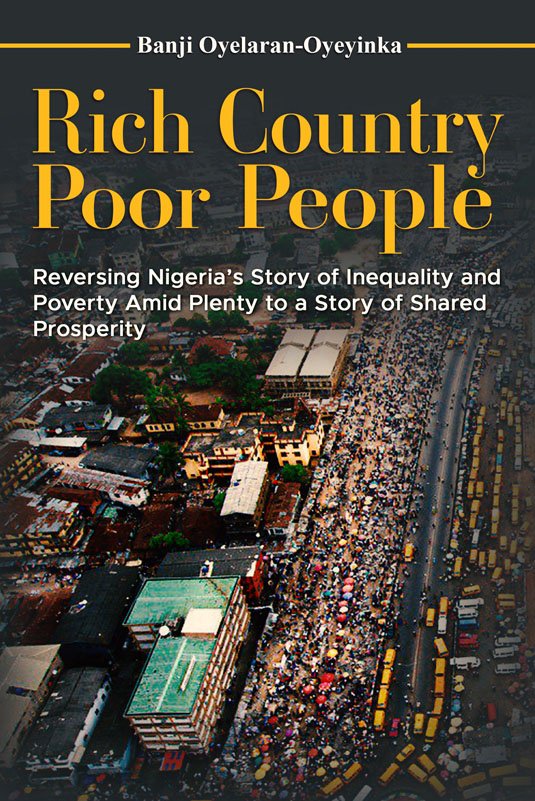Why is Nigeria getting poorer? What is the poverty problem in Nigeria? What is the inequality between the rich and the poor in Nigeria?
Nigeria, often referred to as the “Giant of Africa,” is a country blessed with an abundance of natural resources. It possesses vast reserves of oil, natural gas, minerals, and fertile land.

However, in the face of such riches, Nigeria continues to grapple with persistent poverty and underdevelopment. This post sheds light on the socio-economic dynamics that have hindered the transformation of resource wealth into sustainable development.
To further explore these issues, readers are encouraged to delve into the comprehensive insights presented in Professor Banji Oyeyinka’s book, available at Makeway books.
The Resource Curse Phenomenon
One of the key factors behind Nigeria’s struggle with poverty is the resource curse phenomenon. This paradoxical situation arises when countries rich in natural resources experience slow economic growth, corruption, and social instability.
In the case of Nigeria, the overreliance on oil revenue has created a distorted economy, neglecting other sectors such as agriculture, manufacturing, and services.
Mismanagement of Oil Wealth

Oil accounts for a significant portion of Nigeria’s export earnings, but the mismanagement of oil wealth has been a major hindrance to development. Corruption, weak governance, and lack of transparency in the oil sector have led to vast sums of money being syphoned off through illicit practices.
According to the Nigerian Extractive Industries Transparency Initiative (NEITI), Nigeria lost an estimated $10.4 billion to oil theft and corruption in 2019 alone.
Inadequate Infrastructure
Despite its oil wealth, Nigeria’s infrastructure remains woefully inadequate, hindering economic diversification and development. Insufficient investments in roads, ports, power supply, and telecommunications have hampered industrial growth and stifled the country’s potential.
For example, inadequate power supply is a major challenge faced by businesses, leading to high operational costs and reduced competitiveness.
Population Pressure
Nigeria’s rapidly growing population poses another challenge to its economic development. With over 200 million people, Nigeria is the most populous country in Africa. This demographic pressure places significant strain on public services, education, healthcare, and employment opportunities.
Insufficient investment in human capital development has limited the potential of the population to contribute effectively to economic growth.
Weak Institutions and Governance

Weak institutions and poor governance have perpetuated Nigeria’s poverty trap. Corruption is pervasive at various levels of society and has undermined public trust, impeded economic growth, and deterred foreign investment.
The lack of accountability, transparency, and the rule of law further exacerbate the challenges faced by the country.
Regional Inequalities
Nigeria’s wealth is not evenly distributed, resulting in stark regional inequalities. While oil-rich regions such as the Niger Delta have witnessed significant environmental degradation and social unrest, other parts of the country, particularly the North, face higher levels of poverty and insecurity. This disparity in wealth distribution perpetuates social tensions and hinders national unity.

In conclusion, Nigeria’s paradox of rich resources amidst persistent poverty is a complex issue with multifaceted causes. The resource curse, mismanagement of oil wealth, inadequate infrastructure, population pressure, weak institutions, and regional inequalities all contribute to this conundrum. Addressing these challenges requires comprehensive reforms and targeted policies aimed at economic diversification, good governance, and social inclusion.
Banji Oyeyinka’s book provides further in-depth analysis and recommendations on how Nigeria can navigate this intricate landscape and unlock its true potential. By visiting https://banjioyeyinka.com/, you will gain invaluable insights into the path toward sustainable development and poverty eradication in Nigeria. It is an essential read for policymakers, scholars, and anyone seeking to understand the intricacies of Nigeria’s development challenges and the prospects for a brighter future. Get your copy here.
FAQs
How does Nigeria’s reliance on oil contribute to its economic challenges?
Nigeria’s heavy dependence on oil revenue has led to an imbalanced economy, neglecting other sectors and exposing the country to the volatility of global oil prices. This reliance has also fueled corruption and hindered economic diversification.
How does corruption impact Nigeria’s development?
Corruption undermines public trust, diverts funds away from public investments, and discourages foreign investment. It perpetuates a culture of impunity, weakens institutions, and hampers economic growth and development.
How does population pressure affect Nigeria’s development?
Nigeria’s rapidly growing population places strain on public services, education, healthcare, and employment opportunities.
Insufficient investment in human capital development limits the potential for economic growth and exacerbates poverty.
How can Nigeria address its regional inequalities?
Addressing regional inequalities requires equitable resource allocation, targeted development initiatives, and inclusive policies that ensure the benefits of growth are shared across all regions. It also necessitates addressing the root causes of conflict and promoting social cohesion.

